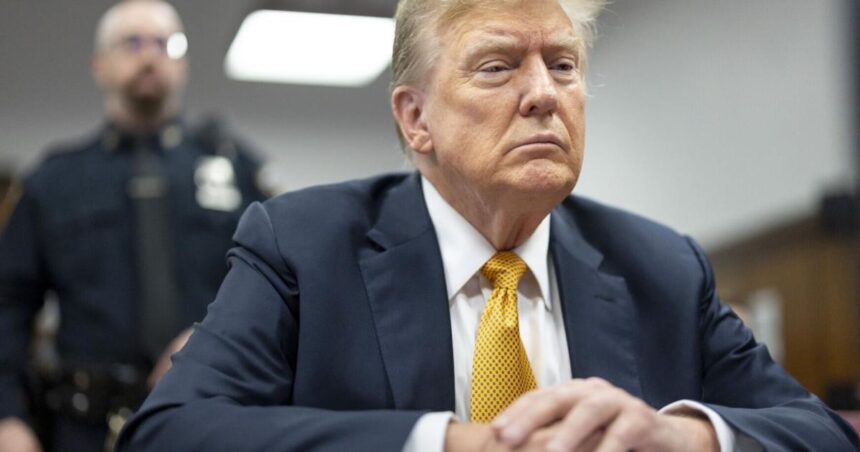NEW YORK (AP) — Closing arguments in Donald Trump ‘s historic hush money trial began Tuesday morning in a Manhattan courtroom, giving prosecutors and defense attorneys one final opportunity to convince the jury of their respective cases before deliberations begin.
Defense lawyer Todd Blanche spoke for about 2 1/2 hours in the morning while prosecutor Joshua Steinglass was expected to go as long as 4 1/2 hours. Court continued much longer than usual — stretching past 7 p.m.
Jurors will undertake the unprecedented task of deciding whether to convict the former U.S. president of felony criminal charges stemming from hush money payments tied to an alleged scheme to buy and bury stories that might have threatened Trump’s 2016 presidential campaign.
People are also reading…
At the heart of the charges are reimbursements paid to Michael Cohen for a $130,000 hush money payment that was given to porn actor Stormy Daniels in exchange for not going public with her claim about a 2006 sexual encounter with Trump.
Prosecutors say the payments to Cohen, Trump’s then-lawyer, were falsely logged as “legal expenses” to hide the true nature of the transactions.
Trump has denied all wrongdoing.
He pleaded not guilty to 34 counts of falsifying business records, charges which are punishable by up to four years in prison.
Closing arguments are expected to last all day Tuesday, with jury deliberations beginning as soon as Wednesday.
The case is the first of Trump’s four indictments to go to trial as he seeks to reclaim the White House from Democrat Joe Biden.
The other cases center on charges of illegally hoarding classified documents at his estate in Palm Beach, Florida, and conspiring to overturn the 2020 presidential election. It’s unclear whether any of them will reach trial before the November election.
— Here’s what every key witness said at Donald Trump’s hush money trial
— As Trump’s hush money trial nears end, would-be spectators camp out for days to get inside
— Closing arguments, jury instructions and maybe a verdict? Major week looms
— Trump hush money case: A timeline of key events
— Key players: Who’s who at Trump’s hush money criminal trial
— Hush money, catch and kill and more: A guide to unique terms used at Trump’s trial
PROSECUTOR CITES EXAMPLES OF INTIMIDATION BY TRUMP BEFORE COURT TAKES ITS FINAL RECESS
Prosecutor Joshua Steinglass showed jurors a series of Donald Trump’s social media posts lashing out at his former lawyer Michael Cohen after Cohen defected, which the prosecutor argued were not only designed to punish the former fixer, but to signal to other potential witnesses: “cooperate and you will face the wrath of Donald Trump.”
He also cited lawsuits Trump had filed against Cohen and Daniels as other examples of intimidation.
“The defendant wanted everyone to see the cost of taking him on,” Steinglass said.
A related argument, regarding threats Daniels said she faced after going public, prompted Trump’s lawyers to object. Defense lawyer Todd Blanche called it “extraordinarily prejudicial.” Steinglass stressed that he wasn’t suggesting Trump was behind the threats, but Judge Juan Merchan told him to move along anyway.
The sides argued briefly over that issue while the jury was out of the courtroom for the final recess.
But the day wasn’t over. The prosecution’s summation, which began around 2 p.m., was still going as of 7 p.m.
Merchan told Steinglass he’s facing a hard out at 8 p.m. All day, jurors have said they can work until that time, but not later, the judge said. Merchan suggested the lawyer have his colleagues give him a note to indicate when it reaches that time so he can then wrap up his statement.
“Thanks for sticking with me,” Steinglass tells jurors as he settled back in at the podium after the break.
PROSECUTION DISCUSSES ASSERTION THAT PAYMENTS TO COHEN WERE FOR HIS LEGAL WORK
During closing arguments in Donald Trump’s hush money trial Tuesday, Prosecutor Joshua Steinglass said Michael Cohen did little work for Trump in 2017, despite the checks he was receiving.
Trump’s lawyers contend the payments were for legal services Cohen provided that year. Steinglass pointed to Cohen testifying he did only about 10 hours of legal work that year.
“Mr. Cohen spent more time being cross-examined at this trial than he did doing legal work for Donald Trump in 2017,” Steinglass quipped. “Do you think there’s any chance Donald Trump would pay $42,000 an hour for legal work by Michael Cohen?”
Steinglass seized on a 2018 Trump tweet in which the then-president described the arrangement with Cohen as “reimbursement” while insisting it was unrelated to Trump’s candidacy.
“Mr. Cohen, an attorney, received a monthly retainer, not from the campaign and having nothing to do with the campaign, from which he entered into, through reimbursement, a private contract between two parties, known as a non-disclosure agreement, or NDA,” Trump wrote at the time.
Steinglass said that while the payments didn’t come out of campaign funds, “the payment has everything to do with the campaign.”
“And yet they still try to argue that the payments to Cohen in 2017 were for legal services rendered — because to say anything else is to admit that the business records were false, and they can’t do that,” the prosecutor said of his counterparts at the defense table.
Steinglass said the defense’s characterization of the payments to Cohen is also undermined by the fact that Trump didn’t pay Cohen anything in 2018, despite Cohen performing legal work for Trump that year.
The prosecutor also argued it would be “crazy” to think former Trump company finance chief Allen Weisselberg and Cohen devised the payment plan on their own. Trump surely would have asked questions about the $35,000 checks to Cohen that came to him to sign, the prosecutor asserted.
“Don’t buy this bogus narrative that the defense is selling — that the defendant was too busy to know what he was signing,” Steinglass urged jurors. “The defendant’s entire business philosophy was and is to be involved in everything, down to negotiating the price of the light bulbs.”
PROSECUTION TURNS TO THE DANIELS PAYOUT AS CLOSING ARGUMENTS RESUME
Prosecutor Joshua Steinglass turned from the hush money arrangements before the 2016 election to the alleged effort to mask reimbursement to Michael Cohen, Donald Trump’s former lawyer, for the Stormy Daniels payout as closing arguments resumed Tuesday in Trump’s trial in New York.
Steinglass argued the case has “smoking guns” — in the form of handwritten jottings by former Trump company finance chief Allen Weisselberg and ex-controller Jeffrey McConney.
The two documents show calculations related to the payments Cohen got in 2017. They included his reimbursement for the $130,000 he’d paid Daniels, as well as an unrelated reimbursement, a bonus, and money to cover taxes, according to testimony.
While the defense suggested that Cohen was the driving force in the decision to style the payments as fees for legal services, the Weisselberg and McConney notes are “overt manifestations” that that’s not so, the prosecutor argued.
COURT TAKES A BREAK, BUT IS NOT DONE YET
Court in Donald Trump’s hush money trial recessed for a 20-minute break just before 5 p.m. Tuesday.
Before sending jurors out of the courtroom, Judge Juan M. Merchan thanked them for making arrangements to stay later than usual. He said some jurors made child care and other arrangements allowing them to stay until 7 p.m. or 8 p.m.
“I think right now we’re going to try to finish this out tonight,” he said.
The judge also noted that all of the jurors still looked alert. “I don’t think we’re losing anyone,” he observed.
While Manhattan famously has a night court that handles arraignments — first court appearances of those recently arrested — it’s unusual for state court trials there to run as late as 7 p.m. or 8 p.m. Merchan has been consulting with high-level court security officers, among others, about the plan.
PROSECUTION’S CLOSING ARGUMENT STRETCHES INTO THIRD HOUR
The prosecution’s closing argument in Donald Trump’s hush money case stretched into its third hour Tuesday afternoon as prosecutor Joshua Steinglass recapped the details of the back-and-forth between Stormy Daniels’ representatives and Michael Cohen over the payoff deal.
Steinglass supplemented his detailed recitation with phone records, text messages, encrypted communications and excerpts of testimony, seemingly trying to reinforce his theme that there’s a “mountain” of corroboration for the allegations at hand.
Meanwhile, Trump is taking in this leg of the summation with his head back and his eyes closed — a strategy he’s employed throughout the trial.
STEINGLASS CONNECTS ‘ACCESS HOLLYWOOD’ TAPE AND DANIELS PAYMENT
Prosecutor Joshua Steinglass stressed late Tuesday afternoon that to understand the hush money case against Donald Trump, jurors needed to understand the climate in which the deal to pay off Stormy Daniels was made — just after the “Access Hollywood” tape leak had “caused pandemonium in the Trump campaign.”
“It’s critical to appreciate this,” Steinglass said.
At the same time he was dismissing his words on the tape as “locker room talk,” Trump “was negotiating to muzzle a porn star,” the prosecutor said.
“Stormy Daniels was a walking, talking reminder that the defendant wasn’t only words. She would have totally undermined his strategy of spinning away the ‘Access Hollywood’ tape,” Steinglass said.
PROSECUTION DUBS ‘ACCESS HOLLYWOOD’ TAPE A ‘CATEGORY 5 HURRICANE’
Following a brief afternoon break in closing arguments in Donald Trump’s hush money trial, prosecutor Joshua Steinglass turned his attention to the publication of the infamous “Access Hollywood” tape in October 2016 and the resulting fallout for the then-candidate’s campaign.
Steinglass reminded jurors how Hope Hicks, then the campaign’s communications director, testified that news coverage of the tape knocked a Category 4 hurricane out of the headlines.
Steinglass dubbed the tape a “Category 5” hurricane.
COHEN RECORDING SHOWS TRUMP WAS WILLING TO ‘HIDE THIS PAYOFF,’ PROSECUTOR ARGUES
Before an afternoon break on Tuesday, prosecutor Joshua Steinglass stressed that Michael Cohen’s secret recording, in which he was allegedly briefing Trump on a plan to buy the rights to McDougal’s story from the National Enquirer, “shows the defendant’s cavalier willingness to hide this payoff.”
“This shows the defendant suggesting paying in cash,” the prosecutor said as he showed jurors a transcript of the September 2016 recording. “It doesn’t matter if that means a bag of cash or no financing, no lump sum. He’s trying to do it in a way that leaves no paper trail, that’s the whole point.”
“This tape unequivocally shows a presidential candidate actively engaging in a scheme to influence the election by reimbursing AMI for the McDougal story,” Steinglass added.
He argued that’s why the defense tried so hard to discredit it.
PROSECUTION PUSHES BACK ON DEFENSE EFFORTS TO CAST DOUBT ON COHEN’S RECORDING OF CALL WITH TRUMP
The prosecution on Tuesday targeted the defense’s efforts to cast doubt on a September 2016 recording that Michael Cohen made of a conversation with Donald Trump in which the two are allegedly heard discussing a plan to buy the rights to former Playboy model Karen McDougal’s story





